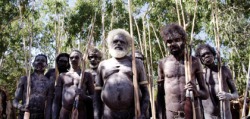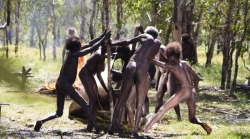Ten Canoes - Rolf de Heer (2006)
The tone of Ten Canoes, not something one would normally associate with Indigenous Australian cinema, was very refreshing to see and lays a large basis for discussion on a variety of topics. One that stuck out particularly for me, was the use of the Indigenous language throughout the entire film, with only the narration in English, this technique is not something that would normally be expected in what is technically an Australian film, primarily because we are an English speaking country. The use of this native dialect also aids the authentic feel of the film, where it even borders on the impression of a documentary. One of the other aspects of Ten Canoes that borders on the realm of documentary was the shots and use of the landscape. Obviously the landscape has always been an extremely prevalent concept in Australian film, television and narratives, and Ten Canoes was no exception. The opening sequence shows some incredibly beautiful bird’s eye views of Australia’s native outback landscape, which then situates the audience into the context of the film. As it centres around an indigenous population, the film is constantly surrounded by the notions of the native landscape, which is inherently considered an ‘Australian’ concept, but is also an integral part of the indigenous way of life.
But the thing I probably enjoyed most about Ten Canoes was the fact that there was no interaction with ‘whites’ in the film, which aided the feel that the film was a genuine indigenous story. It was uplifting not to have to see conflict between the whites and indigenous communities, but just to get consumed into a purely indigenous story. Although I admit I have a lack of knowledge and experience with Australian films, I must say that I haven’t seen or heard of a film quite like Ten Canoes, and I think that is why I enjoyed it so much. It was very aesthetically pleasing, had a narrative to keep the audience interested and the characterisation was commendable. This probably has something to do with the fact that the indigenous Australians in the film were not actors, but real indigenous communities, making the film, once again, all that much more genuine. And this complete authenticity in itself, I find is hard to locate in most Australian films.
But the thing I probably enjoyed most about Ten Canoes was the fact that there was no interaction with ‘whites’ in the film, which aided the feel that the film was a genuine indigenous story. It was uplifting not to have to see conflict between the whites and indigenous communities, but just to get consumed into a purely indigenous story. Although I admit I have a lack of knowledge and experience with Australian films, I must say that I haven’t seen or heard of a film quite like Ten Canoes, and I think that is why I enjoyed it so much. It was very aesthetically pleasing, had a narrative to keep the audience interested and the characterisation was commendable. This probably has something to do with the fact that the indigenous Australians in the film were not actors, but real indigenous communities, making the film, once again, all that much more genuine. And this complete authenticity in itself, I find is hard to locate in most Australian films.


 RSS Feed
RSS Feed